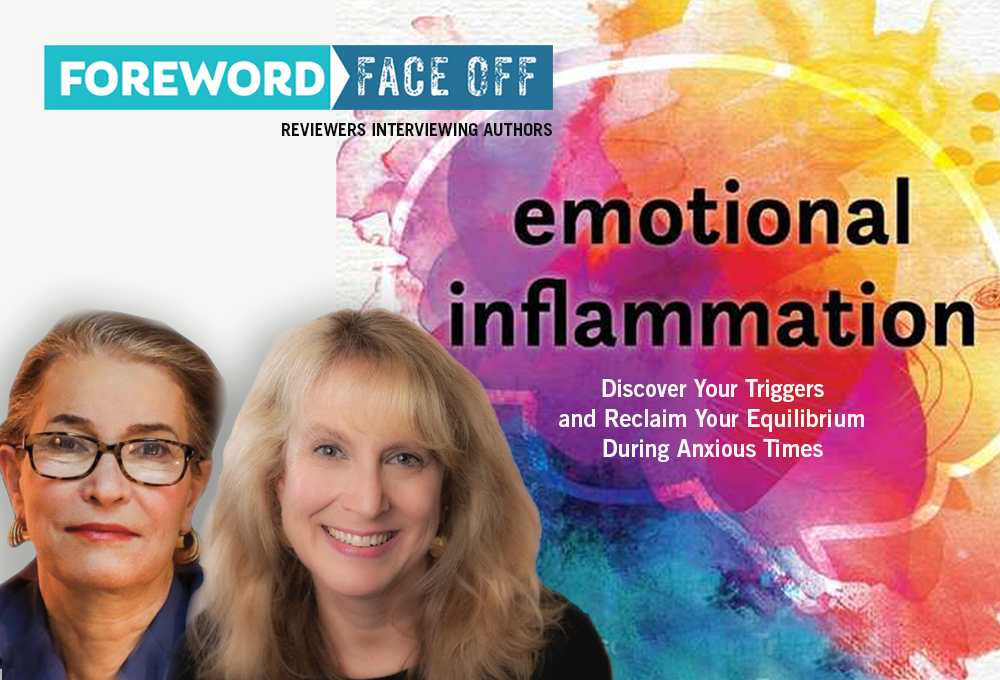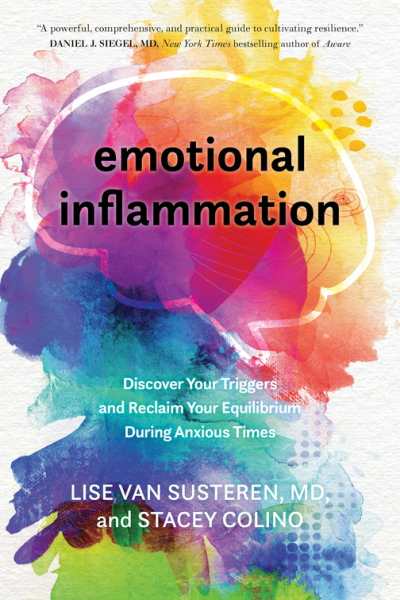Reviewer Melissa Wuske Interviews Lise Van Susteren and Stacey Colino, Authors of Emotional Inflammation: Discover Your Triggers and Reclaim Your Equilibrium During Anxious Times

You’re stressed and we are too. It’s like the coronavirus has a psychological component that infects our anxiety bone, which is connected to the panic bone, which is connected to the despair bone. Alas, COVID-19 seems perfectly designed to wreak havoc on our hopes and fears.
But don’t forget that there are tools out there to help you cope, including scores of excellent new books on managing stress. (Not to forget the hundreds of stress-related titles we’ve reviewed over the years in Foreword Reviews.)

This week’s interview is with the authors of Emotional Inflammation: Discover Your Triggers and Reclaim Your Equilibrium During Anxious Times, a project that impressed us with its explanations and prescriptions for living in an anxious world. In her review for the March/April issue of Foreword Reviews, Melissa Wuske wrapped up by saying, “Focused on considering what’s in a person’s control despite the out-of-control world, Emotional Inflammation is a thoughtful self-help book about moving from unhealthy emotional patterns toward healthy rhythms, and about becoming an agent for change.” We like the sound of that.
With the help of publisher Sounds True, we connected Melissa with Emotional Inflammation authors Lise Van Susteren and Stacey Colino for the following calm-inducing conversation.
Melissa, you’re on.
It’s an understatement to say we’re in a particularly divisive political season. What are some key ways to be an “upstander”—“a force for improving the conditions that fuel your fears”—in the months ahead?
Lise: One of the best ways to become an upstander in the current political climate is to speak up about your views and volunteer for issues or candidates you believe in. When you pour your energy, efforts, and ideas into issues you feel passionately about, you can help push the needle in the direction you want to see for the future. That might mean attending rallies or demonstrations, working on voter registration efforts, canvassing on behalf of important issues, or any number of activities. Even talking to other people and sharing your thoughts and knowledge about important issues can help. All of this helps you feel better emotionally.
Why do you think the modern era is so ripe for emotional inflammation around big issues like climate change or gun violence?
Lise: What the climate crisis and gun violence have in common are the classic elements of uncertainty, hidden threats, and a feeling of lack of control, all of which can provoke anxiety. When people can’t predict the threats that are going to come their way and they feel like they can’t do anything to prevent them, that’s the set-up for emotional inflammation.
Social media can sometimes feel like a swamp, ripe with emotional inflammation. What are some general practices or dos and don’ts for engaging in social media?
Stacey: Personally, I find that limiting my exposure to social media when people get ratcheted up about specific issues really helps me maintain my equilibrium. It’s hard not to absorb other people’s anger, vitriol, and negativity from social media. And unfortunately, not everyone takes a compassionate approach to accepting or respecting other people’s points of view on social media. So it’s easy to get amped up emotionally by reading other people’s posts. At a certain point, limiting one’s exposure may be the key to self-preservation.
You identify four different types of reactors—nervous, revved-up, molten, and retreating. Many people live in close relationship or proximity to people who are a different kind of reactor. What are some tips for communicating across these different response languages?
Lise: It’s important to recognize that other people have different ways of coping with stress—that is, of processing and responding to what’s happening in our tumultuous world. If we acknowledge this and keep the lines of communication open—by asking people how and why they’re feeling the way they do, being sensitive to their triggers, and accepting our varying responses—that will help us understand and support each other better.
I recently read an article about children who are facing debilitating stress about climate change. What are some tips for parenting in ways that both protect children and teach them to engage effectively?
Stacey: As a parent of a teenager who is experiencing “climate stress,” I believe it’s important to ask them about their specific fears—about what they worry will happen—then to validate their emotions while examining what the science tells us about this issue. Engaging in critical thinking—by considering how likely it is that X will happen in their lifetime, for example—can help defuse some of their fears. At the same time, it’s important to talk about the things we must all do to curb our own contributions to the climate crisis: When you discuss the ways we can personally help reduce carbon dioxide emissions—whether it’s by buying produce that’s grown locally and is in season or taking a train instead of a plane to visit relatives—it shows kids that they can do something to help.
Many people are living such harried lives that it’s hard for them to tune into, much less respond to, what their bodies are saying. What are some doable first steps for these kinds of people?
Stacey: It helps to periodically hit the pause button during the day and check in with yourself: Consider how you’re feeling, whether you’re carrying tension in a particular part of your body or breathing shallowly. Then, take a few minutes to close your eyes, focus on your breathing, and relax your body from head to toe. This is really about making it a priority to take your own emotional pulse then to calm it, as needed.
How can a person balance caring for their personal baggage—current work or family stress, triggers from past trauma—with the need or desire to engage in current events?
Lise: By identifying the common emotional denominators between how current events are making you feel and how your current stress or past trauma affects you, you can become better at recognizing how these influences mutually compound the effects. Once you become aware of this dynamic, you can manage your personal affairs and push current events out of the picture temporarily. The idea isn’t to avoid current events—it’s important to stay informed about what’s happening in the world—but to not let them interfere with how you feel and function in your own life. At the heart of this, it’s essential to prioritize taking care of your body’s needs—by getting good quality sleep, steadying your circadian rhythms, consuming a healthy, anti-inflammatory diet, exercising regularly, and taking time to regularly decompress from stress. That’s the best approach to creating a foundation of calm.
Melissa Wuske
